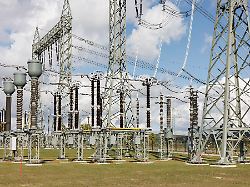High investment requirement
Tennet wants to sell the German network to the federal government
02/10/2023, 12:11 p.m
The power grid operator Tennet will have to invest billions in grid expansion over the next few years. But the Netherlands as owners have little desire to spend money in Germany. The thousands of kilometers of lines are therefore to be sold to Berlin. There one is not averse.
The Dutch operator Tennet wants to negotiate with the federal government about the sale of its German electricity network to the state. The reason is the high equity requirement for the energy transition, which Tennet put at 15 billion euros just for the expansion of its German network. The federal government welcomes Tennet’s move “to want to explore a complete sale”, as a spokeswoman for the Federal Ministry of Economics said.
Last year, Tennet estimated the need for investment in the network at 35 billion euros by 2035, with Germany accounting for the lion’s share. The recently significantly higher interest rates on the capital market make investments even more expensive. According to Tennet, the Dutch government has no interest in co-financing the investments in Germany. “Tennet’s equity requirements for this decade are increasing,” the statement said. “It has become clear that the Dutch government prefers to finance Tennet’s Dutch activities, currently estimated at ten billion euros.”
The Tennet parent company is owned by the Dutch state. In Germany, the company is one of the four transmission system operators. According to the company, Tennet operates 24,500 kilometers of high and extra-high voltage lines in both countries. The German Tennet area is the largest of the four operators in terms of area and extends in a north-south corridor from the North Sea to the Austrian border. The German subsidiary is based in Bayreuth.
Both the Dutch and German governments have extensive and expensive expansion plans for their respective power grids. In Germany, the Tennet network area in particular is affected by the expansion plans, said the ministry spokeswoman. However, that would exceed the company’s financial strength, as the Tennet announcement shows.
FDP warns against state monopoly
As early as 2020, the Dutch government had made it public that it would prefer the federal government to be involved to cover the money requirements. Both governments have been talking about a possible German participation in Tennet Germany since October, as the ministry spokeswoman announced. “The talks are constructive.”
The FDP energy expert Michael Kruse said that a possible takeover of the German Tennet subsidiary should only be an intermediate step. “In this case, the federal government would have to work on awarding contracts to private companies. If there were no longer any private investors for energy networks in Germany, then that would be an alarm signal that something was going wrong with the design of the energy transition. State monopolies are not in a position to to bring about the necessary innovations.”
In 2018, the federal government had already taken over 20 percent of the east German network operator 50Hertz via KfW after a Chinese company also had an eye on it. According to insiders, KfW is also taking a minority stake in the electricity network operator TransnetBW. In the course of the Russian gas supply stop, the federal government also nationalized the suppliers Uniper and Sefe, formerly Gazprom Germania, last year.
